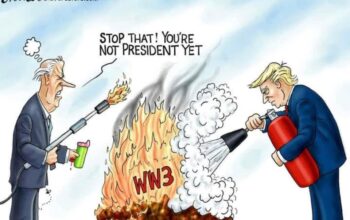Once again. The purpose of legalizing marijuana was NOT to end criminal action. The purpose was to normalize the use of pot—so those selling it on the street corners and the drug cartels would not be harassed.
“When voters approved California’s Proposition 64 in 2016, they did so believing that “a legal market would wipe out the drug’s outlaw business and the violence and environmental disaster associated with it.” Instead, the Times found, it’s done the opposite.
Illegal weed farms are flooding parts of rural California on a scale never before witnessed, exacerbating violence, labor exploitation, environmental damage and more. Police are overwhelmed and can raid only a small percentage of the farms; even then, the growers are often back in business within days.
The Times also found that the black market growers are using “banned, lethal pesticides and unchecked chemicals,” and that “small farms operating legally are unable to sell their crops, pushing them closer to financial ruin.”
Loks like the real goal of legalization is being reached—the crime groups are making a mint out of the sale of pot—and the cops can do very little to stop it.
Say, Wasn’t Legalizing Marijuana supposed to End Crime?

I & I Editorial Board, 10/22/22
When President Biden announced he was pardoning those charged under federal law with possession of marijuana, he added that he’s looking into “how marijuana is scheduled under federal law,” which to many meant he’s moving toward decriminalizing. “Too many lives have been upended because of our failed approach to marijuana.”
Biden is right about lives being upended because of the federal government’s current approach to pot, and that putting marijuana in the same category as heroin makes little sense. But anyone pushing for legalized marijuana should look at what’s going on in California before cheering this on.
That state, as have several others, legalized marijuana on the promise that it would reduce crime, improve public health, increase traffic safety, and stimulate the economy. Instead of wasting time prosecuting people for possession or for selling pot, states could capture a new revenue source by taxing it. Legalization would also mean that states could regulate it, presumably making the marijuana safer and free of adulterants.
So far, 19 states and the District of Columbia have legalized marijuana for nonmedical use, according to the National Conference of State Legislatures.
While it’s certainly lived up to the raising revenue promise, as the Los Angeles Times found after an exhaustive investigation, it’s done little else.
When voters approved California’s Proposition 64 in 2016, they did so believing that “a legal market would wipe out the drug’s outlaw business and the violence and environmental disaster associated with it.” Instead, the Times found, it’s done the opposite.
Illegal weed farms are flooding parts of rural California on a scale never before witnessed, exacerbating violence, labor exploitation, environmental damage and more. Police are overwhelmed and can raid only a small percentage of the farms; even then, the growers are often back in business within days.
The Times also found that the black market growers are using “banned, lethal pesticides and unchecked chemicals,” and that “small farms operating legally are unable to sell their crops, pushing them closer to financial ruin.”
“The scale of the crisis is immense,” it reports.
Those who pushed hardest for legalization are having a hard time coping with these facts.
For example, the libertarian Reason Foundation declared in 2016 that: “taxes may incentivize a small remnant of a black market to avoid taxes, such as California has with cigarettes to avoid tobacco taxes. But by making it legal to grow your own, the incentive for a black market is even more diminished. Opponents’ assertion that black markets increase in a legalized market are unsubstantiated and frankly ludicrous.”
What did Reason say after the Los Angeles Times proved them so wrong? That the state government is to blame because “state and local taxes drive up prices” and because of “the exorbitant costs to do business legally in the state.” As if those factors weren’t present in California in 2016.
Nor is there any evidence that legalization will reduce violent crime rates. A study from the libertarian Cato Institute found no clear impact one way or another. Colorado, Oregon, Alaska, and California saw crime rates increase post-legalization. In Washington state, where violent crime had been on the downtrend, the rates flattened out. Others continued the trend set before legalization. Only one state, Nevada, saw a clear drop in violent crime after the state legalized pot.
Cato’s data only goes through 2018, and the more recent data won’t be of any comfort. In Colorado, for example, violent crime, which counts homicides, aggravated assaults, sex assaults and robberies, is up 17% between 2019 and 2021. Murder is up 47% in those two years, notes Colorado Public Radio. In California, the violent crime rate increased by 6.0% in 2021, aggravated assaults were up 8.9%, and homicides climbed.
Crime rates are rising sharply across the country, including in areas with legal pot. That’s due largely to leftist “rogue prosecutors” who won’t prosecute criminals and “defund police” efforts that starved police departments of funds and killed morale. If you want to combat crime, taking crimes off the books isn’t going to do it. Arresting and incarcerating dangerous felons is.
So, what is the more likely outcome of legalizing marijuana nationwide? Will it be peace and harmony, like advocates continue to predict? Or will it be, as Sen. Tom Cotton, R-Ark., put it “an enormous gift to the cartels and gangs, and in the midst of a nationwide violent crime surge”?
Mind you, we aren’t arguing either for or against legalization. Only that people be less Pollyannaish about it.



